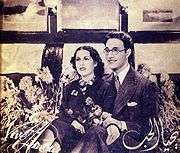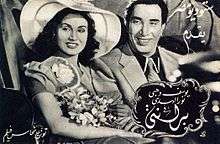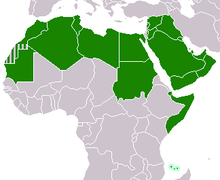Cinema of Egypt
| Cinema of Egypt | |
|---|---|
| Number of screens | 294 (2010)[1] |
| • Per capita | 0.4 per 100,000 (2010)[1] |
| Main distributors |
The Trinity: (Nasr - Oscar - El Massah) Al Arabia Cinema Company[2] |
| Produced feature films (2005-2009)[3] | |
| Total | 42 (average) |
| Number of admissions (2010)[4] | |
| Total | 31,000,000 |
| Gross box office (2010)[4] | |
| Total | $74.7 million |
| Cinema of Egypt |
|---|
 |
| Cairo Film Festival |
| Lists of Egyptian films |
| Pre 1930 |
| 1930s |
| 1940s |
| 1950s |
| 1960s |
| 1970s |
| 1980s |
| 1990s |
| 2000s |
| 2010s |
The cinema of Egypt refers to the flourishing Egyptian Arabic-language film industry based in Cairo, the capital of Egypt. Since 1976, Cairo has held the annual Cairo International Film Festival, which has been accredited by the International Federation of Film Producers Associations.[5] There is also another festival held in Alexandria. Of the more than 4,000 short and feature-length films made in Arabic-speaking countries since 1908, more than three-quarters were Egyptian.
History
Beginnings
| Life in Egypt |
|---|
 |
| Culture |
| Demography |
| Politics |
| Wildlife |

While a limited number of silent films were made in Egypt from 1896 (with 1927's Layla notable as the first full-length feature), Cairo's film industry became a regional force with the coming of sound. Between 1930 and 1936, various small studios produced at least 44 feature films. In 1936, Studio Misr, financed by industrialist Talaat Harb, emerged as the leading Egyptian equivalent to Hollywood's major studios, a role the company retained for three decades.[6]
Historians disagree in determining the beginning of cinema in Egypt, there are those who said that beginning in 1896 with the first film watched in Egypt, while others thought that the beginning of cinema in the June 20, 1907 with the a short documentary film about the visit of Khedive Abbas Hilmi II to the Institute of Mursi Abul-Abbas in Alexandria. In 1917, the director Mohamed Karim established a production company in Alexandria. The company produced two films: Dead Flowers and Honor the Bedouin, which were shown in the city of Alexandria in early 1918.
Since then, more than 4000 films have been produced in Egypt, three quarters of the total Arab production. Egypt is the most productive country in the Middle East in the field of film production, and the one with the most developed media system.
The Golden Age

The 1940s, 1950s and the 1960s are generally considered the golden age of Egyptian cinema. As in the West, films responded to the popular imagination, with most falling into predictable genres (happy endings being the norm), and many actors making careers out of playing strongly typed parts. In the words of one critic, "If an Egyptian film intended for popular audiences lacked any of these prerequisites, it constituted a betrayal of the unwritten contract with the spectator, the results of which would manifest themselves in the box office."[7]
In 1940,[8] the entrepreneur and translator Anis Ebeid established "Anis Ebeid Films", as the first subtitling company in Egypt and the Middle East, bringing hundreds of American and World movies to Egypt. Later he entered the movie distribution business too.[9]
Political changes in Egypt after the overthrow of King Farouk in 1952 initially had little effect on Egyptian film. The Nasser regime sought control over the industry only after turning to socialism in 1961.[10] By 1966, the Egyptian film industry had been nationalized. As is the case regarding all matters during that period, diametrical opinions can be found about Cinema industry then. In the words of Ahmed Ramzi, a leading man of the era, "it went to the dogs".[11] The "heavy government hand" that accompanied nationalization of Egyptian film "stifled innovative trends and sapped its dynamism".[10] However, considering a rather modern moderate review like that given by Dubai International Film Festival,[12] Most of the 44 Egyptian films featuring in the best 100 Arab films of all time were produced during that period. Notable titles included The Night of Counting The Years, Cairo Station and The Postman.
By the 1970s, Egyptian films struck a balance between politics and entertainment. Films such as 1972's Khalli Balak min Zouzou (Watch out for Zouzou), starring "the Cinderella of Arab cinema", Suad Husni, sought to balance politics and audience appeal. Zouzou integrated music, dance, and contemporary fashions into a story that balanced campus ferment with family melodrama.[13]
Transitional period
The late 1970s and 1980s saw the Egyptian film industry in decline, with the rise of what came to be called "contractor movies". Actor Khaled El Sawy has described these as films "where there is no story, no acting and no production quality of any kind... basic formula movies that aimed at making a quick buck." The number of films produced also declined, from nearly 100 movies a year in the industry's prime to about a dozen in 1995. Throughout most of 1980, the West German filmmaker Teod Richter worked in Cairo filming what would become his last film, the 248 minute silent feature "Memory Through Tales Told".[14]
This lasted until summer 1997, with "Ismailia Rayeh Gayy" (translation: Ismailia back and forth). The comedy shocked the cinema industry enjoying unparalleled success and providing large profits for the producers, introducing Mohammed Fouad (a famous singer) and Mohammed Henedy a rather unknown actor who then became the number one comedian star. Building on the success of that movie, several comedy films were released in the following years
Present
Since the 1990s, Egypt's cinema has gone in separate directions. Smaller art films attract some international attention but sparse attendance at home. Popular films, often broad comedies such as What A Lie!, and the extremely profitable works of comedian Mohamed Saad, battle to hold audiences either drawn to Western films or, increasingly, wary of the perceived immorality of film.[10]
A few productions, such as 2003's Sahar el Layali (Sleepless Nights), intertwined stories of four bourgeois couples[15] and 2006's Imarat Yacoubian (The Yacoubian Building) bridge this divide through their combination of high artistic quality and popular appeal.
In 2006, the film Awkat Faragh (Free Times) was released. A social commentary on the decline of Egyptian youth, the film was produced on a low-budget and with the attendant low production values. The film, however, became a success. Its controversial subject matter, namely, the sexual undertones in today's society, was seen as confirmation that the industry was finally beginning to take risks.
A major challenge facing Egyptian and international scholars, students, and fans of Egyptian film is the lack of resources in terms of published works, preserved and available copies of the films themselves, and development in Egypt of state and private institutions dedicated to the study and preservation of film. The Egyptian National Film Centre (ENFC), which theoretically holds copies of all films made after 1961, is according to one Egyptian film researcher, "far from being a library, houses piles of rusty cans containing positive copies."[16]
The year 2007, however, saw a considerable spike in the number of Egyptian movies made. In 1997, the number of Egyptian feature-length films created was 16; 10 years later, that number had risen to 40. Box office records have also risen significantly, as Egyptian movies earned around $50 million while American movies, by comparison, earned $10 million. The quality of movies has also improved both in terms of direction and plot.
Festivals
Since 1976, Cairo has held the annual Cairo International Film Festival, which has been accredited by the International Federation of Film Producers Associations.[5] There is also another festival held in Alexandria. Of the more than 4,000 short- and feature-length films made in Arabic-speaking countries since 1908, more than three-quarters were Egyptian.
Notable films
| Transliteration | Year | Arabic | Translation | Director |
|---|---|---|---|---|
| Abi foq al-Shagara[17] | (1969) | ابي فوق الشجرة | My Father above the Tree | Hussein Kamal |
| Afarit el-asphalt[18] | (1996) | عفاريت الاسفلت | The Asphalt boogymen | Oussama Fawzi |
| Ali Baba wa Al arbain haramee[19] | (1942) | علي بابا والاربعين حرامي | Ali Baba and The Forty Thieves | Togo Mizrahi |
| Ana Horra | (1959) | أنا حرة | I Am Free | Salah Abu Seif |
| Arak el-balah[20] | (1998) | عرق البلح | Date Wine | Radwan El-Kashef |
| Ard El-Khof[21] | (1999) | ارض الخوف | The Land Of Fear | Daoud Abdel Sayed |
| Ard, El[22] | (1969) | الارض | The Land | Youssef Chahine |
| Asfour, Al[23] | (1972) | العصفور | The Sparrow | Youssef Chahine |
| Awdat al ibn al dal[24] | (1976) | عودة الابن الضال | The Return of the Prodigal Son | Youssef Chahine |
| Awlad Masr[25] | (1933) | أولاد مصر | Sons of Egypt | Togo Mizrahi |
| Ayam El-Sadat | (2001) | أيام السادات | The Days of Sadat | Mohamed Khan |
| Ayde Al-Na'ema, El | (1963) | الأيدي الناعمة | The Soft Hands | Mahmoud Zulfikar |
| Azima, El[26] | (1939) | العزيمة | The Will | Kamal Selim |
| Bab el shams | (2004) | باب الشمس | The Gate of Sun | Yousry Nasrallah |
| Bab El-Hadid | (1958) | باب الحديد | Cairo Station | Youssef Chahine |
| Baheb el cima | (2004) | بحب السيما | I Love Cinema | Oussama Fawzi |
| Bahths an Al-Sayyid Marzuq, Al | (1990) | البحث عن السيد مرزوق | The Search for Sayed Marzouk | Daoud Abdel Sayed |
| Baree', El | (1988) | البرئ | The Innocent | Atef El-Tayeb |
| Barsoum Yabhas Aen Wazifa | (1923) | برسوم يبحث عن وظيفة | Barsoum Looking for a Job | Mohamed Bayoumi |
| Bidaya wa Nihaya | (1960) | بداية ونهاية | A Beginning and an End | Salah Abu Seif |
| Boustaguy, Al | (1968) | البوسطجي | The Postman | Hussein Kamal |
| Darb al-mahabil | (1955) | درب المهابيل | The Path of Mahabil | Tawfik Saleh |
| Doaa al-Karawan | (1959) | دعاء الكروان | The Nightingale’s prayer | Henry Barakat |
| Eisharit morour | (1995) | إشارة مـرور | Traffic Light | Khairy Beshara |
| Fi bilad Tout Ankh Amoun | (1923) | في بلاد توت عنخ أمون | In the Land of Tutankhamun | |
| Gannat al shayateen | (1999) | جنة الشياطين | The Paradise of the Fallen Angels | Oussama Fawzi |
| Gezeera, El | (2007) | الجزيرة | The Island | Sherif Arafa |
| Ghazal Al Banat | (1949) | غزل البنات | The Flirtation of Girls | Anwar Wagdi |
| Haram, Al | (1965) | الحرام | The Sin | Henry Barakat |
| Hassan wi Mor'os | (2008) | حسن ومرقص | Hassan & Marcus | Ramy Emam |
| Haya aw Maut | (1954) | حياة او موت | Life or Death | Kamal El Sheikh |
| Ikhtiyar, Al | (1970) | الإختيار | The choice | Youssef Chahine |
| Irhab wal kabab, Al | (1992) | الإرهاب والكباب | Terrorism and Kebab | Sherif Arafa |
| Iskanderija... lih? | (1978) | الإسكندرية... ليه؟ | Alexandria... Why? | Youssef Chahine |
| Karnak, Al | (1975) | الكرنك | Karnak | Ali Badrakhan |
| Kit Kat, El | (1991) | الكيت كات | The Kit Kat | Daoud Abdel Sayed |
| Laabet el sitt | (1946) | لعبة الست | The Lady's Puppet | Waley-ElDin Sameh |
| Laila | (1927) | ليلى | Laila | |
| Malak al-Rahma | (1946) | ملاك الرحمة | Angel of Mercy | Youssef Wahbi |
| Medina, El[27] | (1999) | المدينة | The City | Yousry Nasrallah |
| Mummia, Al | (1975) | المومياء | The Mummy (The Night of Counting the Years) | Shadi Abdel Salam |
| Mustahil, El | (1966) | المستحيل | The Impossible | Hussein Kamal |
| Nasser Salah El-Din, El | (1963) | الناصر صلاح الدين | Saladin The Victorious | Youssef Chahine |
| Omaret yakobean | (2006) | عمارة يعقوبيان | Yaaqubian building | Marwan Hamed |
| Rossassa Fel Qalb | (1944) | رصاصة في القلب | A Bullet in the Heart | Mohammed Karim |
| Rudda kalbi | (1958) | رُدَّ قلبي | Return My Heart Back | Ezz-El-Din Zulfikar |
| Salama fi khair | (1938) | سلامة في خير | Salama Is Fine | Niazi Mostafa |
| Salamah | (1945) | سلامة | Salamah | Togo Mizrahi |
| Sawaq El-Autobis | (1983) | سواق الأوتوبيس | The Bus Driver | Atef El-Tayeb |
| Shey min el khouf | (1969) | شئ من الخوف | Some of the Fear | Hussein Kamal |
| Sira' al-abtal | (1962) | صراع الأبطال | Struggle of the Heroes | Tawfik Saleh |
| Suq al-Soda, Al | (1945) | السوق السودا | Black Market | Kamel El-Telmissany |
| Tharthara Fawq Al Neel | (1971) | ثرثرة فوق النيل | Adrift on the Nile | Hussein Kamal |
| Tooq wal Eswera, El | (1986) | الطوق والاسورة | The Collar and the Bracelet | Khairy Beshara |
| Weda'an Bonapart | (1985) | وداعًا بوناپارت | Adieu Bonaparte | Youssef Chahine |
| Yateematain, Al | (1949)[28] | اليتيماتان | The Two Orphans | Hassan Al Imam |
| Yawm al-Sadis, Al[29] | (1986) | اليوم السادس | The Sixth Day | Youssef Chahine |
| Yawm Saeed[30] | (1940) | يوم سعيد | Happy Day | Mohammed Karim |
| Yom mor... Yom helw[31] | (1988) | يوم مر .. يوم حلو | Sweet Day, Bitter Day | Khairy Beshara |
| Zawgat Ragol Mohim | (1988) | زوجة رجل مهم | The Wife of an Important Man | Mohamed Khan |
| Zeinab[32] | (1950) | زينب | Zeinab | Mohammed Karim |
| Zouga El tania, El | (1967) | الزوجة التانية | The Second Wife | Salah Abu Seif |
Notable figures
Directors
- Ahmed Badrakhan (1909–1969)
- Anwar Wagdi (1904–1955)
- Atef E-Taieb (19??–1995)
- Chadi Abdel Salam (1930–1986)
- Daoud Abdel Sayed (1946–)
- Ezzel Dine Zulficar (1919–1963)
- Hassan Al Imam (1919–1988)
- Henry Barakat (1912–1997)
- Hussein Kamal (1932–2003)
- Jehane Noujaim (1974–)
- Khairy Beshara (1947–)
- Maher Sabry (1967–)
- Mahmoud Zulfikar
- Marwan Hamed
- Mohamed Khan (1942–)
- Mohammed Karim (1896–1972)
- Salah Abu Seif (1915–1996)
- Shady Abdel Salam (1930–1986)
- Sherif Arafa (1960–)
- Tamer El Said (1972–)
- Yousry Nasrallah (1952–)
- Youssef Chahine (1926–2008)
- Youssef Wahbi (1898–1982)
Cinematographers
Actors
- Abd El Fatah El Quossary (1905–1965)
- Abd El Moneim Ibrahim (1924–1987)
- Abd El Moneim Madbouly (1921–2006)
- Abd El Salam El Naboulsi (1899–1968)
- Abdelhalim Hafez (El Andaleeb) (1929–1977)
- Adel Emam (El Zaeem) (1940–present)
- Ahmed Helmy (1969–present)
- Ahmed El Sakka (1973-present)
- Ahmed Mazhar (1917–2002)
- Ahmad Zaki (1949–2005)
- Aly El Kassar (1887–1957)
- Amina Rizk (1910–2003)
- Anwar Wagdi (1904–1955)
- Emad Hamdy (1909–1984)
- Ezzel Dine Zulficar (1919–1963)
- Ezzat Abou Aouf (1948–present) عزت أبو عوف
- Farid al-Atrash (1915–1974)
- Farid Shawky (1920–1998)
- Faten Hamama (1931–2015)
- Fatma Rouchdi (1908–1996)
- Fuad Al Mohandes (El Ostaz) (1924–2006)
- Hend Rostom (1929–2011)
- Hussein Fahmy (1940–present)
- Ismail Yasin (1912–1972)
- Khaled Abol Naga (1966–present)
- Layla Murad (1918–1995)
- Lebleba (1945–present)
- Mary Queeny (1913–2003)
- Mervat Amin (1946–present)
- Mohamed Abdel Wahab (1902–1991)
- Mounira El Mahdeya (1885–1965)
- Nabila Ebeid (1941–present)
- Nadia Lutfi (1937–present)
- Nahed Sherief (1942–1981)
- Naguib Al Rihani (1889–1949)
- Naima Akef (1932–1966)
- Nelly Mazloum (1929–2003)
- Nelly (1949–present)
- Nour El-Sherif (1946–2015)
- Omar Sharif (1932–2015)
- Rushdy Abaza (1926–1980)
- Sabah (singer) (1921–2014)
- Samia Gamal (1924–1994)
- Samir Sabry (1932–present)
- Sanaa Gamil (1932–2002)
- Shadia (1929–present)
- Shukry Sarhan (1925–1997)
- Shwikar (1939–present)
- Soad Hosni (El Cindrella) (1943–2001)
- Tahiya Carioca (1920–1999)
- Youssef Wahbi (1898–1982)
- Yousra (1955–present)
- Zaki Rostom (1903–1972)
- Zouzou Nabil (1920–1996)
Film critics
Music Composers
- Ammar El Sherei (1948–2012)
- Omar Khairat (1948-–present)
See also
In the press
References
- 1 2 "Table 8: Cinema Infrastructure - Capacity". UNESCO Institute for Statistics. Retrieved 5 November 2013.
- ↑ "Table 6: Share of Top 3 distributors (Excel)". UNESCO Institute for Statistics. Retrieved 5 November 2013.
- ↑ "Average national film production". UNESCO Institute for Statistics. Retrieved 5 November 2013.
- 1 2 "Table 11: Exhibition - Admissions & Gross Box Office (GBO)". UNESCO Institute for Statistics. Retrieved 5 November 2013.
- 1 2 Cairo Film Festival information.
- ↑ Darwish, Mustafa, Dream Makers on the Nile: A Portrait of Egyptian Cinema, The American University in Cairo Press, Cairo, 1998, Pp. 12–13.
- ↑ Farid, Samir, "Lights, camera...retrospection", Al-Ahram Weekly, December 30, 1999
- ↑ http://www.luxorafricanfilmfestival.com/Resources/Egypt/history-of-cinema-egypt
- ↑ "Archived copy". Archived from the original on 2013-09-28. Retrieved 2013-09-24.
- 1 2 3 Farid, Samir, "An Egyptian Story", Al-Ahram Weekly, November 23–29, 2006
- ↑ Khairy, Khaireya, "Ahmed Ramzi: rendezvous at the snooker club", Al-Ahram Weekly, June 22, 2000
- ↑ http://arabic.rt.com/news/633029-%D9%85%D9%87%D8%B1%D8%AC%D8%A7%D9%86_%D8%AF%D8%A8%D9%8A_%D8%A7%D9%84%D8%B3%D9%8A%D9%86%D9%85%D8%A7%D8%A6%D9%8A_%D9%8A%D8%B5%D8%AF%D8%B1_%D9%82%D8%A7%D8%A6%D9%85%D8%A9_%D8%A3%D9%81%D8%B6%D9%84_100_%D9%81%D9%8A%D9%84%D9%85_%D8%B9%D8%B1%D8%A8%D9%8A/
- ↑ Anis, Mouna, "Before the public gaze", Al-Ahram Weekly, June 28, 2001
- ↑ El Bakry, Rehab, "Reeling them in", Business Monthly, July 2006
- ↑ "Sahar el Layali", The New York Times, 2004
- ↑ El-Assyouti, Mohamed, "Forgotten memories",Al-Ahram Weekly, September 2, 1999
- ↑ IMDb.com
- ↑ IMDb.com
- ↑ IMDb.com
- ↑ IMDb.com
- ↑ IMDb.com
- ↑ IMDb.com
- ↑ IMDb.com
- ↑ IMDb.com
- ↑ IMDb.com
- ↑ IMDb.com
- ↑ IMDb.com
- ↑ IMDb.com
- ↑ IMDb.com
- ↑ IMDb.com
- ↑ IMDb.com
- ↑ IMDb.com
Further reading
- Viola Shafik, Popular Egyptian Cinema: Gender, Class, and Nation, American University in Cairo Press, 2007, ISBN 978-977-416-053-0
- Walter Armbrust, "Political Film in Egypt" in: Josef Gugler (ed.) Film in the Middle East and North Africa: Creative Dissidence, University of Texas Press and American University in Cairo Press, 2011, ISBN 978-0-292-72327-6, ISBN 978-9-774-16424-8, pp 228–251
External links
- Egyptian Cinema Profiles & Currently Now Showing Movies
- Egyptian film at the Internet Movie Database
- African Media Program Comprehensive database of African media
- ShooFeeTV
- El-Cinema.com (an imdb inspired Egyptian/Arabic movie database)
- Egycinemas.com (Currently Now Showing Movies in Egypt)
